Introduction to the Recipe
Nothing quite beats the comforting allure of a rich, flavorful pasta dish, especially when it’s both easy to make and dairy-free. This Creamy Garlic Pasta recipe is a perfect example of simple ingredients coming together to create a luscious, velvety sauce packed with garlic’s aromatic punch and balanced by subtle herbs. What makes this recipe stand out is the use of unsweetened non-dairy milk combined with low-sodium vegetable broth to craft a creamy texture without relying on heavy cream or cheese—making it a wonderful option for those avoiding dairy or looking to lighten up traditional pasta dishes.
The use of fresh garlic and shallots provides a robust base of flavor, while seasonings like black pepper, dried oregano, and red pepper flakes add layers of complexity and a gentle kick. Cooking the fettuccine pasta directly in the broth and milk mixture allows the noodles to absorb those savory flavors fully, resulting in a sauce that clings beautifully to each strand. The finishing touch of fresh basil or parsley adds a burst of color and freshness, rounding out this quick and satisfying meal.
If you want to explore more ways to enhance garlic dishes or learn about choosing the best non-dairy milk for cooking, check out this guide to cooking with garlic and non-dairy milk substitutes for cooking. These resources complement this creamy garlic pasta recipe perfectly.
Whether you’re a seasoned vegan, lactose intolerant, or simply in search of a tasty weeknight dinner, this creamy garlic pasta is guaranteed to impress with its simplicity and rich flavor.
Basic Recipe: Ingredients and Instructions
Print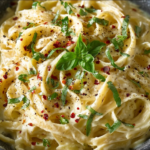
Creamy Garlic Pasta Recipe
Description
Try this easy creamy garlic pasta recipe made with non-dairy milk and fresh herbs for a comforting, dairy-free dinner.
Ingredients
-
½ tbsp olive oil
-
4 cloves garlic, minced
-
1 shallot, finely chopped
-
2 cups low-sodium vegetable broth (adjust salt accordingly)
-
1½ cups plain, unsweetened non-dairy milk (e.g., almond, oat, or soy)
-
1 tsp salt, plus more to taste
-
8 oz dry fettuccine
-
Black pepper, dried oregano, and red pepper flakes, to taste
-
Chopped fresh basil or parsley, for serving
Instructions
-
Heat olive oil:
In a large skillet or saucepan over medium heat, warm the olive oil until shimmering. -
Sauté garlic and shallots:
Add minced garlic and finely chopped shallot to the oil. Cook gently for 2-3 minutes until fragrant and softened but not browned. -
Add liquids and seasoning:
Pour in the vegetable broth and non-dairy milk. Stir in the salt, black pepper, dried oregano, and red pepper flakes. -
Bring to a simmer:
Increase heat and bring the mixture to a gentle simmer. -
Cook the pasta:
Add the dry fettuccine directly to the simmering liquid. Reduce heat to medium-low and cook uncovered, stirring frequently, for about 12-15 minutes, or until the pasta is tender and the liquid has thickened to a creamy sauce. Add more broth or water if needed to prevent sticking. -
Adjust seasoning:
Taste and add additional salt, pepper, or red pepper flakes as preferred. -
Serve:
Dish the creamy garlic pasta onto plates and sprinkle with chopped fresh basil or parsley.
Notes
Use a non-dairy milk with a neutral flavor like unsweetened almond or oat milk for best results.
Low-sodium broth allows you to control saltiness; if using regular broth, reduce added salt.
Stir frequently to prevent pasta from sticking or drying out.
For extra creaminess, you can stir in a tablespoon of vegan butter or nutritional yeast before serving.
Keywords: Creamy Garlic Pasta
Advanced Techniques
Sautéing Garlic and Shallots for Maximum Flavor
Cooking garlic and shallots gently over medium heat helps release their natural sweetness and aroma without burning. Avoid high heat, which can create bitterness. Softened shallots add a subtle onion-like depth that balances the garlic’s pungency.
Choosing the Right Non-Dairy Milk
Different non-dairy milks bring unique textures and flavors. Unsweetened oat milk offers a creamy consistency and mild taste, perfect for savory sauces. Almond milk is lighter but less creamy, while soy milk has a richer protein content, which helps thicken sauces naturally.
Simmering Pasta in Liquid for Infused Flavor
Cooking pasta directly in the broth and non-dairy milk mix lets the noodles absorb flavor during cooking rather than just coating them after. This technique creates a deeply flavorful and cohesive dish but requires frequent stirring and monitoring the liquid level to prevent drying.
Balancing Heat and Herbs
Adding red pepper flakes provides a gentle warmth that complements the creamy base without overwhelming it. Dried oregano adds an earthy, slightly peppery note, while fresh basil or parsley adds brightness and freshness at the end.
Thickening the Sauce Naturally
As the pasta cooks, starch released from the noodles naturally thickens the sauce. If the sauce needs extra creaminess, stirring in a spoonful of vegan butter or a sprinkle of nutritional yeast enhances richness without dairy.
See more advanced recipes at cookingwhite.com
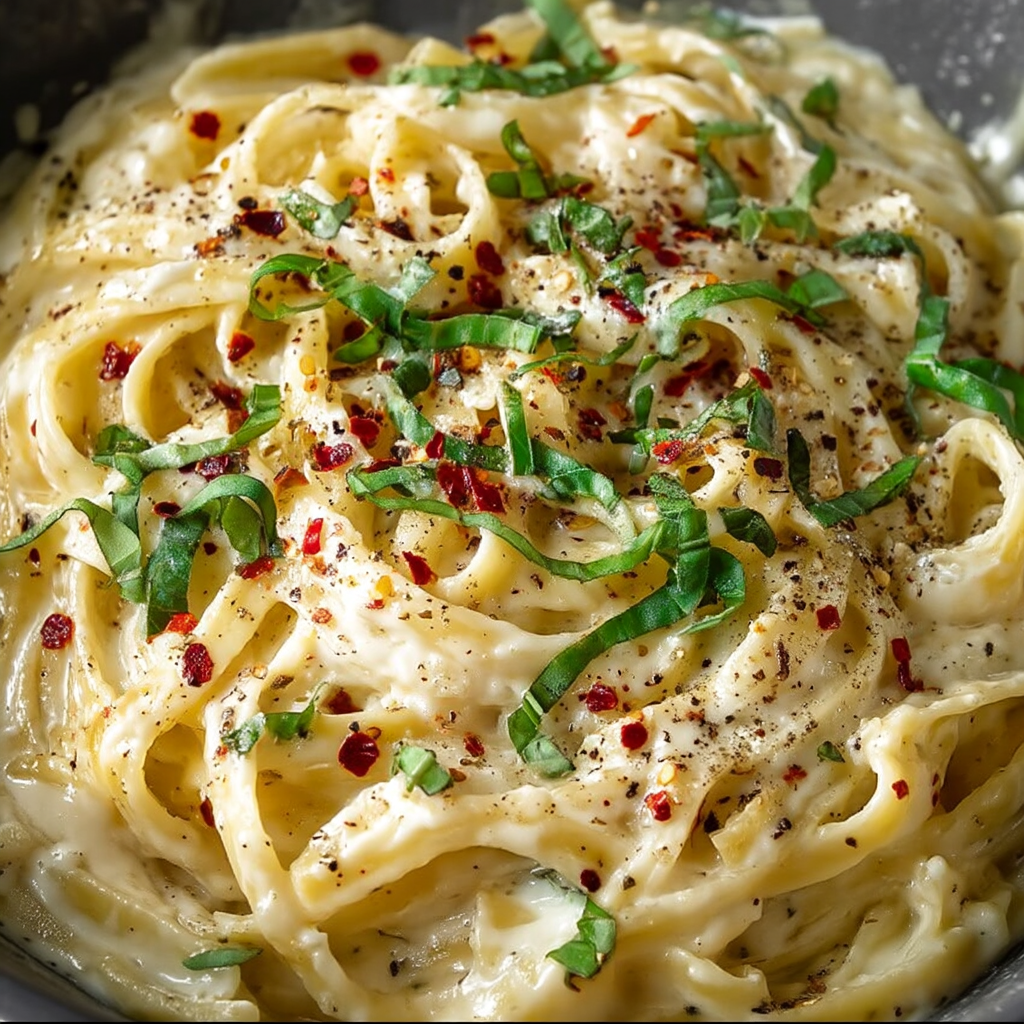
Storage, Shelf Life, and Maintenance Tips
Storing Leftover Creamy Garlic Pasta
Store leftovers in an airtight container in the fridge for up to 3 days. The sauce may thicken; add a splash of broth or non-dairy milk when reheating to restore creaminess.
Freezing Considerations
This dish freezes well. Portion into freezer-safe containers and freeze for up to 2 months. Thaw overnight in the fridge and reheat gently on the stove.
Reheating Best Practices
Reheat slowly over low heat, stirring frequently. Add a little extra broth or non-dairy milk to loosen the sauce and prevent drying.
Maintaining Fresh Herb Flavor
Add fresh basil or parsley only at serving to maintain their bright, fresh taste. Herbs added during storage lose flavor quickly.
Adjusting Sauce Thickness After Storage
Sauce tends to thicken after refrigeration. Stir in small amounts of liquid gradually when reheating to achieve the desired consistency.
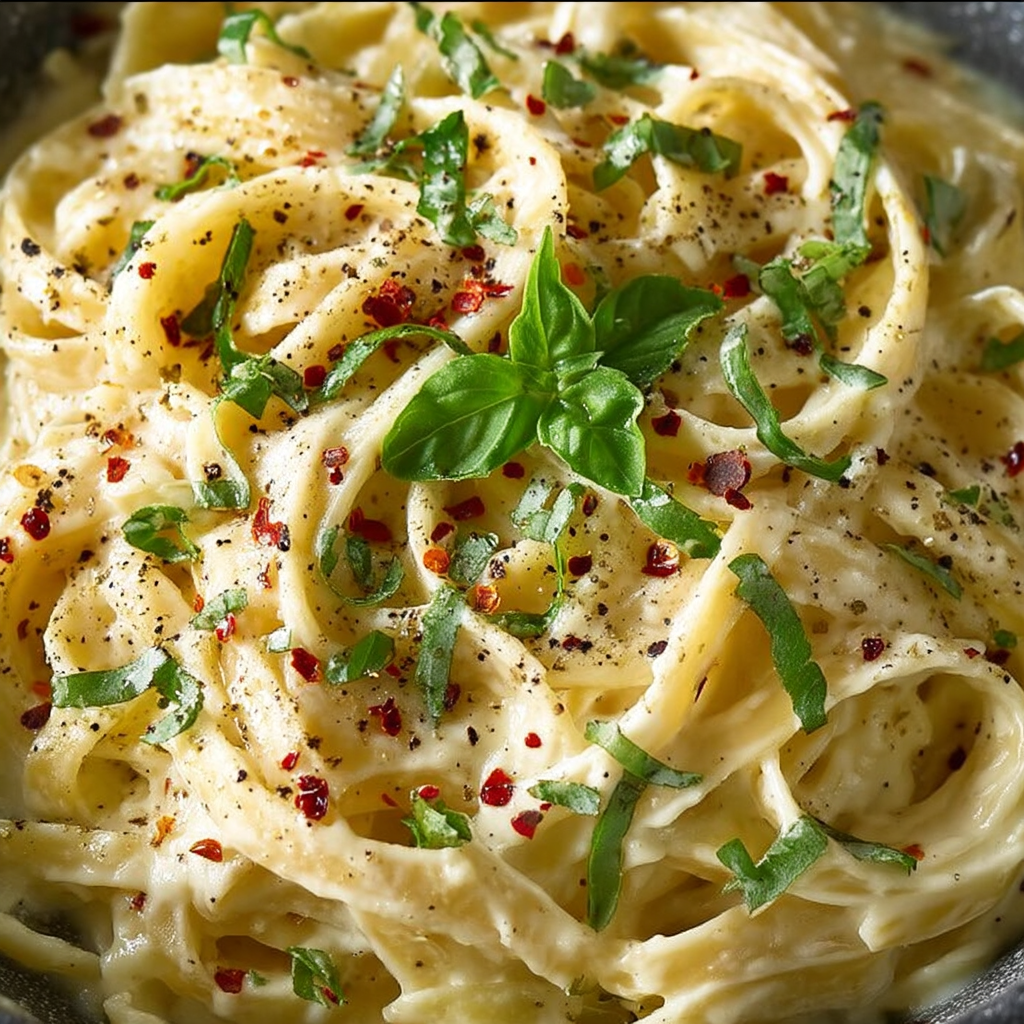
Dietary Adaptations and Substitutions
Gluten-Free Version
Swap traditional fettuccine with gluten-free pasta. Adjust cooking time according to package instructions and monitor liquid levels closely.
Vegan-Friendly
This recipe is naturally vegan when using plant-based milk and vegetable broth. Ensure all ingredients are vegan-certified.
Low-Sodium Adaptation
Use homemade or low-sodium vegetable broth and reduce added salt accordingly to keep sodium levels low without sacrificing flavor.
Nut-Free Options
Choose oat or soy milk if you have a nut allergy, avoiding almond milk. Verify the broth is nut-free as well.
Adding Protein Boosts
Incorporate cooked chickpeas, tofu cubes, or sautéed mushrooms for added protein and texture, keeping the dish wholesome and filling.
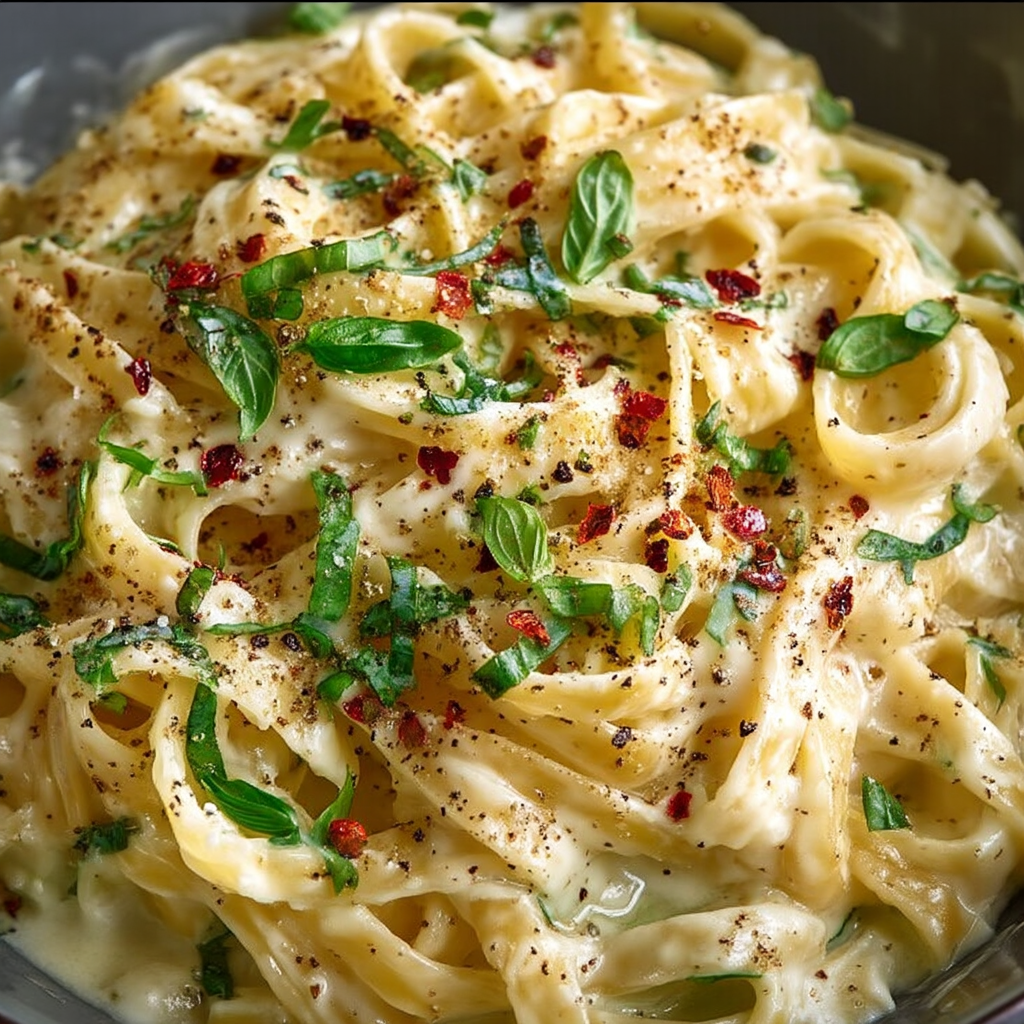
FAQs About the Recipe
Can I Use Regular Milk Instead of Non-Dairy Milk?
Yes! Regular dairy milk can be used if you aren’t avoiding dairy. Whole milk will create a richer sauce, while skim milk results in a lighter dish.
What If My Sauce Is Too Thin?
Simmer longer to reduce excess liquid, or stir in a teaspoon of cornstarch slurry (cornstarch mixed with cold water) to thicken the sauce gently.
Can I Use Different Pasta Shapes?
Absolutely! Penne, linguine, or spaghetti work well too. Adjust cooking times as needed for different pasta shapes.
How Can I Make This Recipe More Spicy?
Increase red pepper flakes or add a pinch of cayenne pepper for a bolder kick.
What If I Don’t Have Shallots?
Use finely chopped onion as a substitute. Shallots have a milder flavor, but onions still work well.
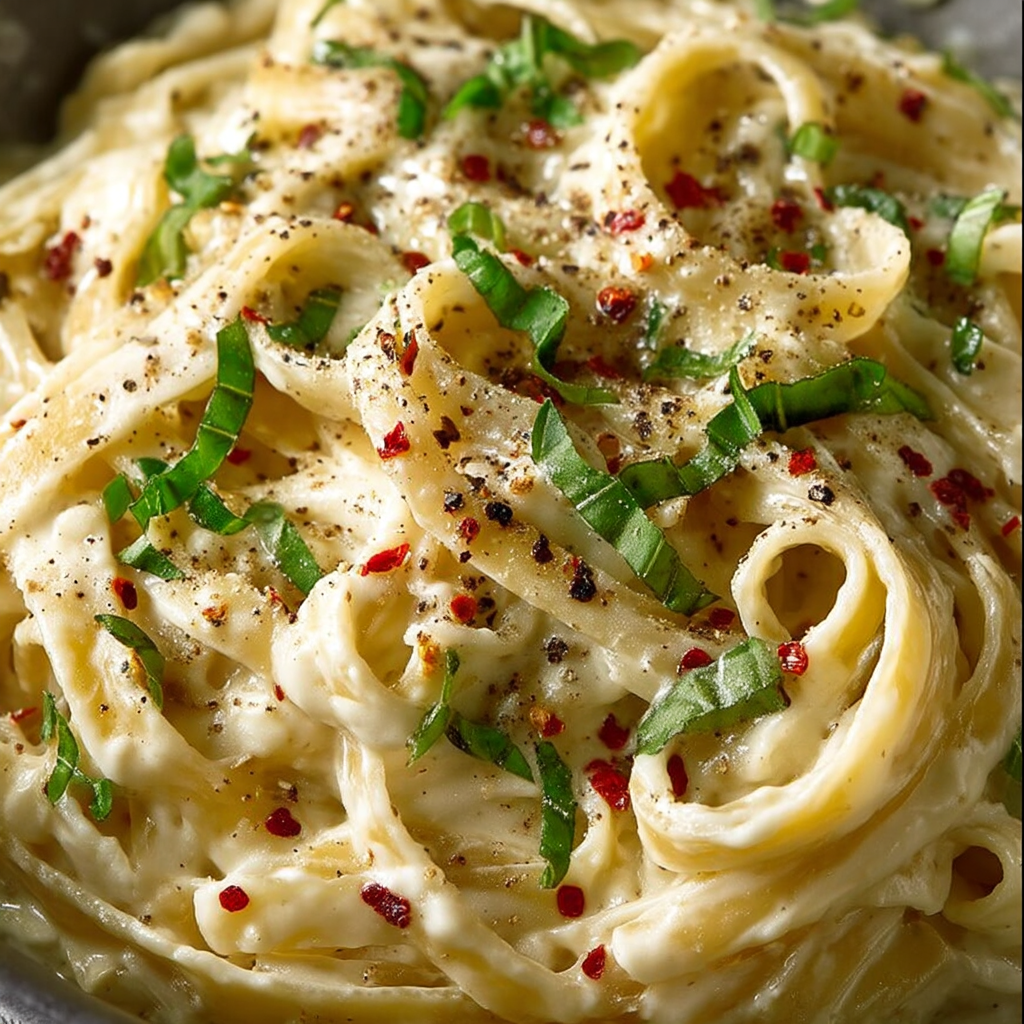
Conclusion & Final Thoughts
The Creamy Garlic Pasta recipe is a simple yet satisfying dish that brings comfort and flavor to your table with minimal effort. It proves that dairy-free cooking can be just as indulgent and creamy without sacrificing taste. The balance of garlic, herbs, and the creamy sauce perfectly coats every bite of fettuccine, making this meal a fantastic choice for weeknights, dinner parties, or whenever you crave something cozy and delicious.
What makes this recipe particularly special is its versatility and accessibility—it caters to a range of dietary needs without complicated substitutions. Whether you’re vegan, lactose intolerant, or simply looking for a lighter pasta option, this recipe fits beautifully into your culinary repertoire. The gentle heat from spices and fresh herbs adds complexity, while the creamy, smooth sauce provides that indulgent mouthfeel everyone loves.
Try pairing this pasta with a crisp green salad or crusty bread for a complete meal. With minimal ingredients and fuss, this dish is perfect for cooks who appreciate simplicity without compromising flavor. Give it a go and enjoy the creamy, garlicky goodness that will keep you coming back for more.
